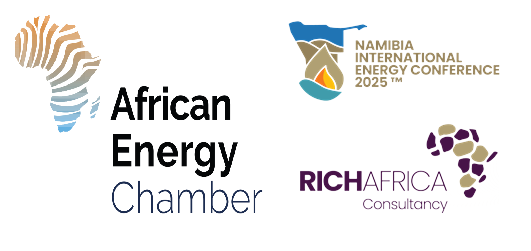
Namibia is on the cusp of a transformative era in its energy sector, with recent oil and gas discoveries positioning the country as a key player in Africa’s energy landscape. To harness this potential and ensure local industries and communities’ benefit, the African Energy Chamber (AEC) is proud to support the 7th Namibia International Energy Conference (NIEC), set to take place from April 23-25, 2025, in Windhoek.
Organized by RichAfrica Consultancy under the leadership of CEO Selma Shimutwikeni, and endorsed by the Ministry of Mines and Energy, the conference will convene global and local energy leaders under the theme, Leading the Way: Becoming an Energy Hub with In-Country Value.
Namibia’s energy sector has witnessed a series of groundbreaking discoveries since 2022, particularly in the Orange Basin, which has attracted global energy giants such as TotalEnergies, Shell, and Galp Energia. Discoveries like Graff-1X, Venus-1X, Jonker-1X, Lesedi-1X, and Mopane-1X have revealed over 11 billion barrels of oil, propelling Namibia into the spotlight as a future oil producer. The country aims to begin oil production by 2029, with recent advancements in the Mopane field potentially accelerating this timeline.
In February 2025, Galp Energia announced a new hydrocarbon column of light oil at the Mopane-1A well in offshore PEL 83. The discovery, which includes gas condensate and light oil in high-quality reservoirs, underscores the significant potential of Namibia’s offshore basins. Galp Energia, alongside partners Namcor (Namibia’s national oil company) and Custos, is now assessing the commercial viability of these discoveries while continuing exploration and appraisal campaigns.
A key focus of Namibia’s energy strategy is ensuring that its citizens benefit from the country’s resource wealth. In a landmark move, the Namibian cabinet recently approved the National Upstream Local Content Policy, aimed at reducing dependence on foreign expertise and fostering local capacity building. This policy is designed to empower Namibians by creating opportunities for local businesses, labor, and resources in the oil and gas sector, while balancing the needs of international investors.
The policy marks a turning point for Namibia as it seeks to achieve first oil production within four years. By promoting sustainable development, energy independence, and technological expertise, the policy aims to build a globally competitive supply chain while addressing the unique challenges of the capital-intensive and high-risk upstream petroleum sector.
The Namibia International Energy Conference 2025 will serve as a premier platform for fostering partnerships and driving investment in Namibia’s energy sector.
The conference will also feature an interactive exhibition, showcasing cutting-edge technologies and innovative solutions shaping Namibia’s energy future. Additionally, the Future Energy Leaders Initiative will drive youth participation in the energy sector by providing mentorship, skills development, and access to opportunities for young professionals.
NJ Ayuk, Executive Chairman of the African Energy Chamber, emphasized the importance of NIEC 2025 in shaping Namibia’s energy future. “Under the visionary leadership of Selma Shimutwikeni and RichAfrica Consultancy, NIEC 2025 plays a pivotal role in shaping the future of Namibia’s energy sector.
This event provides a vital platform for fostering global partnerships and local empowerment. As Namibia continues to evolve into a regional energy hub, NIEC 2025 stands as a cornerstone for achieving the country’s ambitious goals of sustainable energy development and economic transformation.”
As Namibia strides towards becoming a regional energy hub, the Namibia International Energy Conference 2025 will be a critical event for unlocking the country’s energy potential. By fostering collaboration between global investors and local stakeholders, the conference aims to drive sustainable growth, empower Namibians, and position the country as a leader in Africa’s energy transition. With its vast oil, gas, and renewable resources, Namibia is poised to transform its economy and secure a prosperous future for its people.
